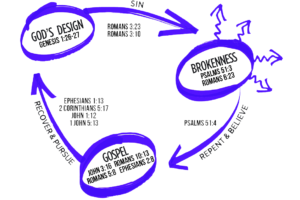- Theological Background of the Trinity
- Development and Controversies
- Practical and Spiritual Implications
- Conclusion
Theological Background of the Trinity
The doctrine of the Trinity in Christianity is not just a foundational theological concept but a profound mystery that has engaged theologians, scholars, and believers throughout the centuries. It postulates one God in three distinct but coequal Persons: the Father, the Son (Jesus Christ), and the Holy Spirit. This section aims to unpack the complexities and nuances of this central Christian doctrine, offering a comprehensive understanding for believers and non-believers alike.
The Biblical Foundation of the Trinity
While the term “Trinity” is not found in Scripture, the concept is deeply rooted in the Biblical narrative. The Old Testament introduces God as the Creator, the Father, and the Lord of salvation history, while the New Testament reveals Him in the person of Jesus Christ and as the Holy Spirit. These scriptural revelations collectively point to a triune God, though not explicitly labeled as the Trinity.
Historical Development of the Doctrine
The formulation of the Trinity doctrine was not an immediate development but a gradual process that unfolded over several centuries. It involved deep theological reflection and numerous controversies, particularly in response to early heresies that challenged the nature of Christ and the Holy Spirit. The early church councils, such as the Council of Nicaea and later the contributions of the Cappadocian Fathers, were instrumental in articulating the doctrine as we understand it today.
Philosophical and Theological Challenges
The Trinity presents a unique philosophical challenge: how to reconcile the monotheism of Judaism, from which Christianity emerged, with the divinity of Christ and the personhood of the Holy Spirit. Early Christian thinkers and theologians grappled with this, leading to various interpretations and heresies, including Arianism. The resolution of these challenges through the ecumenical councils played a crucial role in defining orthodox Christian belief.
Development and Controversies
The development of the Trinity doctrine is a story of theological evolution, marked by debates and controversies that shaped its orthodox understanding. This section delves into the key historical moments and theological disputes that were instrumental in the formation of this central Christian doctrine.
Early Heresies and the Trinity
In the early church, understanding the nature of Christ and His relationship with the Father and the Holy Spirit led to significant theological debates. These discussions often bordered on heresy, as different interpretations emerged about the nature of God and the divinity of Christ. Addressing these heresies was crucial in shaping the doctrine of the Trinity.
The Arian Controversy
The Arian controversy, a significant theological dispute in the early church, questioned the divinity of Christ. Arius, a presbyter in Alexandria, argued that Christ, being the Son of God, was not co-eternal with the Father, thus challenging the concept of a coequal Trinity. This controversy was pivotal in the development of the Trinity doctrine, leading to the formulation of the Nicene Creed, which affirmed the coequality and coeternality of the Father, Son, and Holy Spirit.
Formulating the Orthodox Understanding
The resolution of these early controversies led to a more refined and orthodox understanding of the Trinity. The ecumenical councils, particularly the Council of Nicaea, played a crucial role in this process. They helped articulate the concept of one essence in three persons, balancing the distinctness and unity of the Father, Son, and Holy Spirit, and setting the foundation for orthodox Christian theology.
Practical and Spiritual Implications
The Trinity doctrine is not merely an abstract theological concept; it has tangible implications for Christian life and spirituality. This section explores how the Trinity influences our understanding of God, our spiritual practices, and our daily lives as Christians.
Understanding God Through the Trinity
The Trinity is crucial for a comprehensive understanding of God’s nature. It reveals God as a relational being, existing in a community of Persons. This understanding influences how Christians perceive God’s character, His love, and His interaction with humanity.
Experiential Knowledge of the Trinity
Experiential knowledge of the Trinity goes beyond intellectual understanding. It involves a personal and relational experience with each Person of the Godhead. This experience deepens faith and shapes a believer’s relationship with God, fostering a sense of intimacy and communion with the Father, Son, and Holy Spirit.
The Trinity in Christian Practice
Practical applications of the Trinity doctrine are evident in various aspects of Christian practice, especially in prayer. Christians pray to the Father, through the Son, and in the Holy Spirit, reflecting the relational dynamics within the Trinity. This trinitarian structure of prayer not only aligns with doctrinal beliefs but also enriches the prayer experience, connecting believers more deeply with the divine nature.
Conclusion
The doctrine of the Trinity stands at the heart of Christian monotheism, offering a profound and unique understanding of God’s nature and His interactions with the world. This doctrine is not just a theological concept; it is a vital framework that shapes our understanding of God’s actions, His revelation in history, and our relationship with Him. It challenges and deepens our faith, inviting us into a more intimate and meaningful communion with the triune God. In embracing the mystery and majesty of the Trinity, we find the essence of Christian belief and practice, a foundation that enriches and guides our spiritual journey.
Cited Articles
- Current Issues in Trinitarian Studies – Shepherds Theological Seminary
- Trinity | Definition, Theology, & History – Britannica
- Why the Doctrine of the Trinity Is Crucial for the Christian Life – Crossway Articles






Leave a Reply
Your email is safe with us.
You must be logged in to post a comment.